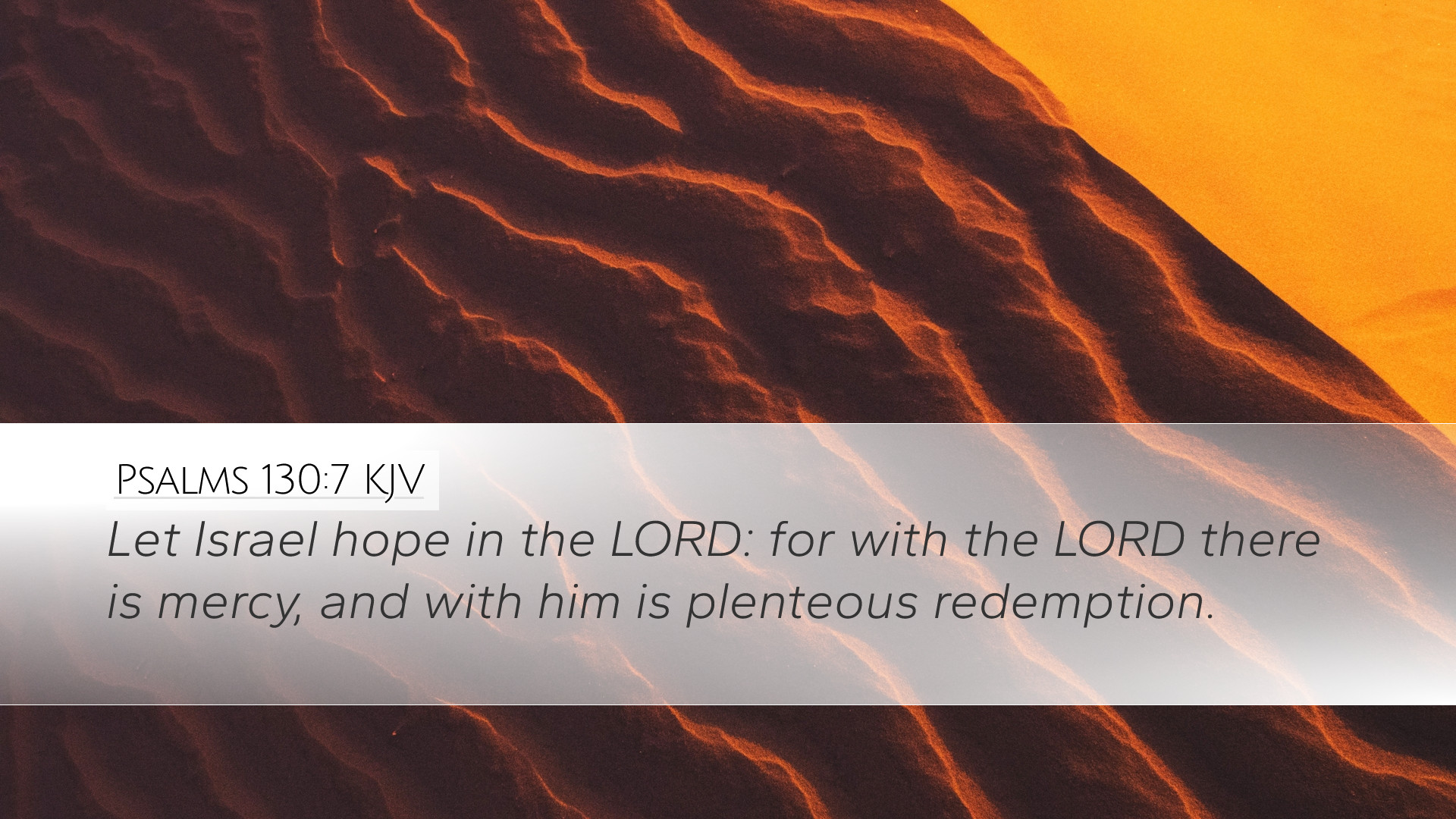Summary of Psalms 130:7
Psalms 130:7 reads: “O Israel, hope in the LORD: for with the LORD there is mercy, and with him is plenteous redemption.” This profound verse encapsulates a call to hope, trust, and the assurance of divine mercy and redemption. It is a powerful declaration that encourages the faithful to place their trust in God amidst trials and tribulations.
Commentary Insights
-
Matthew Henry's Commentary:
Henry emphasizes the theological depth of this verse, suggesting that it serves as a potent reminder of the faithfulness of God. He notes that the hope extended to Israel is not a mere wish but a firm expectation grounded in the character and covenant of God. Henry elaborates that hope is closely tied to mercy, accentuating that without God's mercy, there would be no grounds for hope.
-
Albert Barnes' Notes:
Barnes offers a practical interpretation, observing that this verse serves as an exhortation not only for ancient Israel but for all believers regarding the nature of hope and trust. He clarifies that the phrase "hope in the LORD" implies a complete reliance on God's goodness and faithfulness. Barnes points out that believers are assured of God’s abundant mercy which is a source of genuine comfort and fulfillment.
-
Adam Clarke's Commentary:
Clarke provides a contextual analysis in which he relates the verse to the broader themes of repentance and redemption found in the Psalms. He emphasizes that the call to "hope in the LORD" is deeply connected to the prevailing themes of forgiveness and grace. Clarke underscores the concept of "plenteous redemption" as a reminder of God’s infinite ability to deliver His people from sin and despair, highlighting the believer’s secure position in Christ.
Theological Implications
Upon examination, Psalms 130:7 contributes significantly to the understanding of God's attributes and the believer's response in faith. This verse embodies the tension between human desperation and divine provision.
-
The Nature of Hope:
The hope referenced here is not blind optimism; rather, it is an enduring conviction rooted in who God is. It asserts that hope in the LORD is essential for spiritual vitality and resilience in the face of life's adversities.
-
Divine Mercy:
The verse accentuates the theme of mercy, portraying God as one who is compassionate and ready to forgive. This is a vital aspect for pastoral care, as it speaks to the need for congregations to understand God’s willingness to pardon and restore.
-
Redemption's Abundance:
“Plenteous redemption” emphasizes the transformative power of God’s grace. This notion invites believers to explore the depths of God’s redemptive plan, reminding them that their salvation is both comprehensive and sufficient.
Practical Applications
Psalms 130:7 serves not only as a theological lesson but also as a practical guide for daily living. Here are some applications for pastors, students, and scholars:
- Encouragement in Times of Despair:
This verse can be used to counsel those who are wrestling with feelings of hopelessness, reminding them of the steadfast love and mercy of the LORD.
- Teaching Moments:
In seminaries and Bible studies, this passage can foster discussions on the character of God, the importance of hope in the believer’s life, and the significance of redemption through faith.
- Pastoral Care:
Pastors can utilize this verse to remind their congregations of the hope found in Christ, reinforcing the necessity of depending on God's mercy during personal struggles and societal challenges.
Conclusion
Psalms 130:7 stands as a beacon of hope and a powerful affirmation of God's merciful nature and the abundant redemption He offers. It encapsulates the essence of faith—believing in God's promises despite present circumstances. Through insights gathered from public domain commentaries, the richness of this scripture is illuminated, providing a deeper understanding for scholars and practitioners alike.


